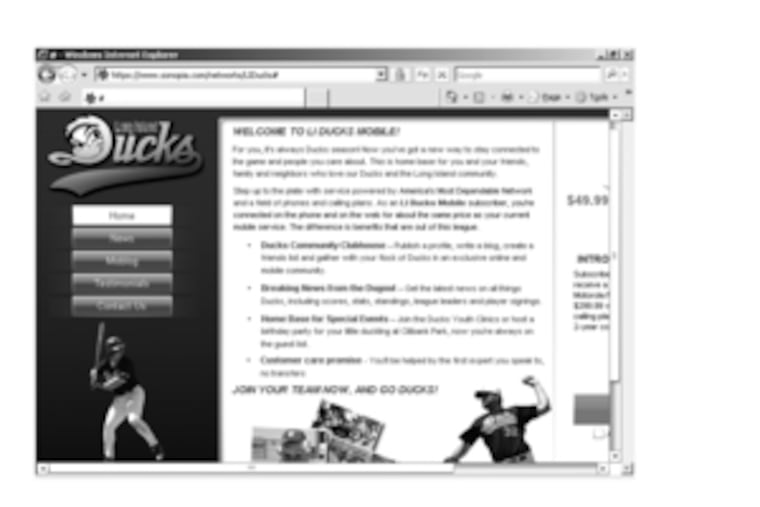Cell-phone firm can be as personal as ring tone
Maybe it's time to stop grumbling about your cell-phone company and just start your own. That was what Rod Farthing did, at 2:30 a.m. no less. It took him just a few minutes to get Farthing Mobile up and running, complete with a selection of national calling plans and cell-phone models.

Maybe it's time to stop grumbling about your cell-phone company and just start your own.
That was what Rod Farthing did, at 2:30 a.m. no less. It took him just a few minutes to get Farthing Mobile up and running, complete with a selection of national calling plans and cell-phone models.
Business has been slow: Since the April launch, Farthing has signed up two subscribers, himself and his son. But he has two prospects in his wife and another son.
Farthing didn't build a cellular network or develop a billing system and everything else that one needs to run a mobile-phone business. Instead, he created Farthing Mobile through Sonopia Corp., a new service that enables groups and individuals to design their own cell brands with a healthy dose of social networking gone mobile. Sonopia buys air time from Verizon Wireless to provide service, a fact hidden by each group's brand on the phone's screen.
"I don't expect to get rich off of it," said Farthing, 50, a self-described "cell-phone junkie" in Toledo, Ohio, who is tailoring his service to people interested in technology. He's also using it for a class project in an e-business college course he teaches. "If I get up to 100 members, I'll be happy. If I get up to 50, I'll be happy."
Since Sonopia's public launch in early April, about 1,000 of these customized cell companies have been created, including about 100 by the start-up's employees.
A handful have been started by sizable nonprofit groups such as the National Wildlife Federation, the National Parks Conservation Association, and the American Medical Student Association. Others were launched by sports teams like minor-league baseball's Long Island Ducks and the Chicago Bandits of the National Pro Fastpitch women's softball league.
But the vast majority of Sonopia's roster of wireless communities were started by individuals, families, and tiny groups with specialized interests.
There's Aviation History Mobile, with 13 members; the 10-member Mums in Business; the 6-member Bitta Irish Phone Club; the 13-member Peninsula Skate Crew Mobile; and the 5-member Scrabble Mobile, featuring weekly contests to devise the highest word score with a set of letter tiles.
Politics, naturally, aren't off-limits. Sonopias are devoted to supporting the presidential ambitions of Sens. Hillary Rodham Clinton and Barack Obama. The polls haven't closed, but Obama for President Mobile leads Hillary Clinton Presidential Campaign, 12 members to 10.
While every tiny cell company adds to the bottom line, nonprofit organizations are a major focus. Sonopia points to the devotion people show for charities, community groups and sports teams as a natural selling point. A small percentage of the phone bill kicks back to the organization, providing an easy way for members to pad their financial support for a cause.
"If you take a cheerleader squad, there is very high affinity. But if you take a big brand like American Airlines, you don't find a lot of American Airlines devotees," said Juha Christensen, a former Microsoft Corp. executive who is the founder and chief executive officer of Sonopia.
Sonopia provides tools for each community to share information, photos, and other multimedia content on the phone, as well as a Web site open to nonsubscribers who just want to be part of that community. So far, about two of every three members are phone subscribers, while the rest are Web-only participants.
Flaky as the notion of enabling this odd assortment of tiny wireless "providers" might sound, Sonopia has drawn $21.3 million in venture capital, including $12.7 million raised just a few weeks ago. It won't disclose how many paying customers it has, but says its break-even point is about 100,000.
Sonopia gives virtual cell companies 3 percent to 8 percent of the monthly proceeds, depending on how many paying customers they have.
Users can choose from a wide array of individual and family calling plans similar to those offered by the major companies, starting at $40 a month for 450 peak minutes with free nights and weekends. Sonopia also offers a set of simplified plans called "Fair and Square," featuring a larger bucket of minutes with no free off-peak periods, such as $37 for 700 minutes. There's a choice of four handsets, with prices ranging from free with a two-year contract to $130 with a one-year commitment.
The American Medical Student Association has signed up 31 of its 70,000 members for AMSA Mobile, which sends users text alerts about matters such as application deadlines, said Jay Bhatt, national president and a fourth-year medical student at the Philadelphia College of Osteopathic Medicine. But he said he would like AMSA Mobile to become a forum for social networking and blogging.
"What we're trying to do right now is sort out and beef up the content," Bhatt said.